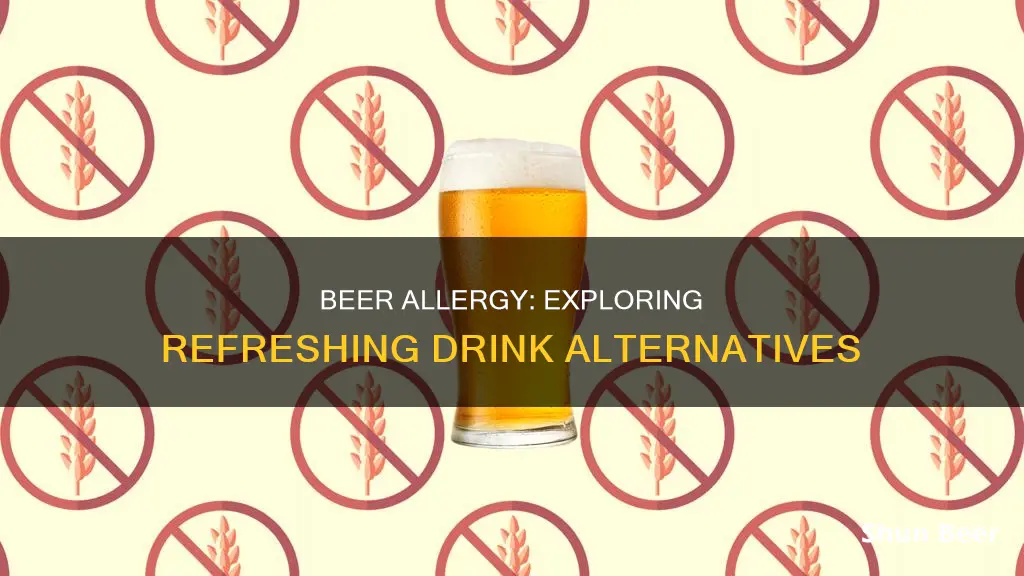
If you're allergic to beer, you may be allergic to one of its many ingredients, such as wheat, yeast, hops, or barley. It's important to note that true beer allergies are rare, and you may instead have a food sensitivity or alcohol intolerance. If you experience symptoms like abdominal pain, bloating, or chest tightness after drinking beer, it's best to consult a doctor or allergist to determine the cause. In the meantime, you might want to explore alternative drinks that don't contain the specific ingredients you're allergic to.
| Characteristics | Values |
|---|---|
| Beer allergy symptoms | Abdominal pain and bloating, chest tightness, hives, wheezing, GI issues, anaphylaxis, shortness of breath, swelling of the throat or tongue, loss of consciousness |
| Beer ingredients that may cause allergies | Malted barley or other grains (e.g. wheat, sorghum), hops, assorted colorings, flavorings, preservatives, yeast |
| Alcohol intolerance symptoms | Stuffy or runny nose, worsening of asthma symptoms, facial redness, hives, fast heartbeat, stomach pain, nausea, vomiting |
| Alcohol intolerance causes | Genetic condition that prevents the body from breaking down alcohol efficiently |
| Alcohol allergy symptoms | Anaphylaxis, rapid weak pulse, nausea, vomiting, swelling, trouble breathing |
| Common allergens in alcoholic beverages | Egg protein, sodium metabisulfite, yeast, hops, barley, wheat |
What You'll Learn

Try gluten-free beer
If you're allergic to beer, you may be allergic to gluten, which is a protein found in wheat, rye, and barley. The main ingredient in beer is usually barley, so if you're allergic to gluten, you'll have to avoid beer or stick to gluten-free options.
Gluten-free beer is made with gluten-free grains like sorghum, millet, buckwheat, rice, and corn. It's a great alternative for those with gluten allergies or sensitivities and can be enjoyed by everyone, even those without gluten restrictions.
When choosing a gluten-free beer, it's important to read the labels carefully. While some beers are naturally gluten-free due to the ingredients used, others may be processed in facilities that also handle gluten-containing products, which can lead to cross-contamination. Look for beers that are certified gluten-free by reputable organizations, as they have met strict standards and are less likely to cause a reaction.
Additionally, keep in mind that gluten-free beers can vary in taste and quality. Some may have a slightly different flavor profile or mouthfeel compared to traditional beers, so it's worth exploring different brands and styles to find the ones that suit your preferences.
If you're newly diagnosed with a gluten allergy, it's not just beer that you need to worry about. Gluten is prevalent in many food items, including bread, pasta, cookies, and even some sauces and condiments. It's important to familiarize yourself with hidden sources of gluten and always read labels to ensure your food and drinks are safe for consumption.
In addition to gluten-free beer, there are also other gluten-free alcoholic options you can explore, such as wine, cider, and spirits. Remember to always drink responsibly and consult a doctor if you have any concerns or questions about managing your allergy.
Beer and Antibiotics: A Painful Mix?
You may want to see also

Try non-GMO beer
If you're allergic to beer, you may be allergic to one of its many ingredients. Beer is primarily made up of water, but it also contains malt barley, brewer's yeast, hops, and assorted flavorings. You may also have a food sensitivity or alcohol intolerance.
Genetically modified organisms (GMOs) in beer have been a topic of discussion in recent years. While some people seek out non-GMO beers for health reasons, others are interested in the ethical production practices of these beverages.
Non-GMO Beer Options
If you're looking for non-GMO beer options, several popular brands offer beers made with non-GMO ingredients. These include:
- Dogfish Head Brewery: Offers a non-GMO option for IPA lovers and a Stout beer with GMO-free sourced ingredients.
- Sierra Nevada: All varieties, including the flagship Sierra Nevada IPA, are made with non-GMO sourced materials.
- Heineken: Brewed with all-natural ingredients and no filler grains or GMOs.
- Amstel Light: Brewed in Amsterdam, this beer contains no artificial ingredients, stabilizers, or preservatives.
- Steam Whistle Brewing: A GMO-Free Pilsner beer and a new IPA, both providing GMO-free options.
- Northcoast Brewing Company: Over a dozen different types of non-GMO beers, including IPAs, wheat beers, lagers, and fruity blends.
- Samuel Smith Organic Beer: A craft beer from a small brewery in the United Kingdom that is organic, vegan, and non-GMO.
- Pinkus: A German brewery offering three varieties of non-GMO beers: a Hefe-weizen, a Munster, and a Pilsner blend.
- Mill Street Brewery: An organic and non-GMO variety of beer, with over 50% of its brews sold as natural options.
In addition to these larger brands, there are also several microbreweries and smaller craft breweries that offer non-GMO beer options.
Other Drinks to Try
If you're looking for alternatives to beer, there are plenty of other alcoholic beverages to choose from. Here are some options to consider:
- Wine: While wine can also contain GMOs, especially in the yeast-making process, there are several non-GMO certified wines available.
- Spirits: Vodka, gin, rum, whiskey, and tequila are all distilled beverages that may be better options if you're looking for a drink with fewer potential allergens.
- Cocktails: Get creative and experiment with different combinations of spirits, mixers, and fresh ingredients to find your new favorite drink.
- Hard Seltzer: These beverages are typically made with fermented cane sugar and fruit flavors, offering a gluten-free and low-calorie alternative to beer.
- Cider: Made from fermented apples or other fruits, cider is a refreshing option that may be better suited to those with allergies or intolerances to beer.
Remember, if you experience any allergic symptoms or reactions after consuming alcohol, it is important to seek medical advice and determine the specific ingredients causing your allergies.
Drinking Beer at Santa Monica Beach: What's Allowed?
You may want to see also

Try organic beer
If you're allergic to beer, you may be allergic to one of its many ingredients. The most common allergens in beer are gluten, histamine, sulphites, and yeast. However, you may also be allergic to a specific type of grain, such as wheat, barley, or sorghum.
If you suspect that you are allergic to beer, it is important to see a doctor, who can help determine the specific ingredient that is causing your allergy. In the meantime, you may want to try switching to organic beer, which does not contain any GMOs or genetically modified corn. Here are some reasons why you should consider trying organic beer:
- Organic beer may be healthier: Organic beer is made with organically grown ingredients, which means that the grains, hops, and other ingredients used are not exposed to synthetic pesticides or fertilizers. This may result in a beer that is free from potential allergens or irritants found in conventionally grown ingredients.
- Organic beer may have fewer additives: Many conventional beers contain additives such as sulphites, sodium benzoate, and tartrazine, which can trigger sensitivities or allergies in some people. Organic beers may have fewer of these additives, making them a better option for those with allergies or intolerances.
- Organic beer may be GMO-free: Genetically Modified Organisms (GMOs) are often found in processed foods and some types of beer. While the research is not conclusive, some people believe that GMOs may contribute to allergies or sensitivities. Organic beers are typically GMO-free, so they may be a better option for those concerned about the potential effects of GMOs.
- Organic beer may be made with simpler ingredients: Organic beers often have shorter ingredient lists and use more basic ingredients, which can be beneficial for those with allergies or sensitivities. By choosing organic beer, you may reduce your exposure to potential allergens or triggers.
- Organic beer may be less likely to cause a reaction: If you find that you can tolerate some beers but not others, it may be worth trying organic varieties. Organic beers may be brewed with different strains of yeast or use different types of hops, which could make them more tolerable for some individuals.
Remember, if you have a severe allergy to beer or any of its ingredients, it is important to always read labels and choose beverages that are safe for you. Even within organic beers, there can be variations in ingredients and brewing processes, so it's important to be cautious and consult with your doctor or allergist if you have any concerns.
Beer and Low-Carb Diets: What You Need to Know
You may want to see also

Try European beer
If you're allergic to beer, you may be allergic to one of its many ingredients, such as wheat, yeast, hops, or barley. Beer also contains histamines, sulfites, and preservatives, which can cause allergic reactions in some people.
While true beer allergies are rare, you may be allergic to a specific ingredient in beer. If you suspect you are allergic to beer, it is important to see a doctor, who can help you determine the cause of your symptoms and advise you on alternative drinks.
If you are allergic to beer, you may want to try European beer. Here are some reasons why:
- European beers may not contain the specific ingredient that you are allergic to. For example, some European beers may not contain wheat, which is a common allergen.
- European beers often have a different blend of hops, yeast, and barley, which may be better tolerated by people with allergies.
- European beers tend to have a lower alcohol content than American beers, which may be easier on the digestive system.
- Some people find that European beers have a smoother taste and are less likely to cause allergies or intolerances.
- European beers are often brewed with traditional methods and natural ingredients, which may be gentler on the body.
When trying European beer, it is important to read the labels and choose beers that do not contain the ingredient that causes your allergy. You can also look for gluten-free or organic beers, which may be less likely to contain allergens. Remember to always drink in moderation and stop consuming any beer that causes an allergic reaction.
Obama's Beer Choice: What's His Favorite Brew?
You may want to see also

Try non-alcoholic drinks
If you're allergic to beer, there are plenty of non-alcoholic drinks you can try. Here are some options to consider:
Water
Water is always a good choice to stay hydrated, and it's calorie-free. Opt for still or sparkling water, depending on your preference.
Juice
Fruit juices offer a range of vitamins and minerals and can be a refreshing alternative to beer. Go for fresh-squeezed options without added sugar or preservatives.
Tea
Tea is a great option, hot or iced, with a variety of flavours and types to choose from. Herbal teas, in particular, offer health benefits, such as aiding digestion and boosting your immune system.
Coffee
If you're looking for a caffeine kick, coffee is a good option. Just be mindful of your caffeine intake, especially if you're sensitive to its effects.
Smoothies
Smoothies made with fresh fruits and vegetables can be a nutritious and tasty choice. You can even add some superfood boosters like chia seeds or flaxseeds for an extra nutritional punch.
Kombucha
Kombucha is a fermented tea that has gained popularity for its potential health benefits, including improved digestion and enhanced immune function. It's a good option if you want something a little different.
Remember, if you're allergic to beer, it's important to carefully read the labels of any drink you're considering. Some non-alcoholic drinks may still contain ingredients that could trigger your allergy, so always check before consuming.
Beer and Prep: What's the Deal?
You may want to see also
Frequently asked questions
If you are allergic to beer, you will probably experience symptoms similar to those of other allergic reactions, such as abdominal pain and bloating, tightness of the chest, hives, wheezing, and swelling of the tongue or throat. An allergic reaction to food usually happens within a couple of hours but can occur almost immediately in the case of severe allergies.
Beer allergies are rare, but they can be caused by an allergy to one of the many ingredients in beer, such as malted barley or other grains, wheat, yeast, hops, assorted colorings, flavorings, preservatives, or sulfites.
If you are allergic to beer, it is recommended that you avoid drinking beer entirely and choose alternative drinks that do not contain the ingredient(s) causing your allergy. For example, if you are allergic to gluten, you can try gluten-free beer or opt for alcoholic beverages like wine or spirits.







